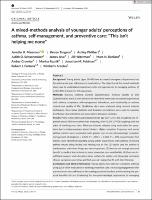Please use this identifier to cite or link to this item:
https://hdl.handle.net/20.500.12202/9844| Title: | A mixed‐methods analysis of younger adults' perceptions of asthma, self‐management, and preventive care: "This isn't helping me none" |
| Authors: | Mammen, Jennifer R. Turgeon, Kelsey Philibert, Ashley Schoonmaker, Judith D. Java, James Halterman, Jill Berliant, Marc N. Crowley, Amber Reznik, Marina Feldman, Jonathan M. Fortuna, Robert J. Arcoleo, Kimberly 0000-0002-7326-3026 |
| Keywords: | young adults Asthma Patience compliance Age groups Sensory perception self-management |
| Issue Date: | Jan-2021 |
| Publisher: | Wiley |
| Citation: | Mammen, J.R., Turgeon, K., Philibert, A., Schoonmaker, J.D., Java, J., Halterman, J., Berliant, M.N., Crowley, A., Reznik, M., Feldman, J., Fortuna, R.J., Arcoleo, K. (2021). A mixed-methods analysis of younger adults’ perceptions of asthma, self-management, and preventive care: “This isn’t helping me none.” Clinical & Experimental Allergy, 51, 63-77. |
| Series/Report no.: | Clinical & Experimental Allergy;51 |
| Abstract: | Background: Young adults (ages 18‐44) have increased emergency department use for asthma and poor adherence to medications. The objective of this mixed‐methods study was to understand experiences with and approaches to managing asthma, of which little is known in this age group. Methods: Surveys (Asthma Control Questionnaire, Asthma Quality of Life Questionnaire) and 1:1 semi‐structured interviews were used to explore experiences with asthma, symptoms, self‐management behaviours, and relationship to asthma control and quality of life. Qualitative data were analysed using content analysis techniques. Descriptive statistics and bivariate correlations were used to examine distributive characteristics and associations between variables. Results: Forty urban adults participated (mean age 32.7 ± 6.2, 1σ). Coughing was reported nearly 46% more often than wheezing, with 42.5% (17/40) coughing until the point of vomiting most days. Most participants delayed using medication for symptoms due to misperceptions about inhalers. Higher symptom frequency and worse asthma control were associated with greater use of non‐pharmacologic symptom management strategies (r = 0.645, P <.001; r = 0.360, P =.022, respectively). Five themes were identified regarding young adults experiences with asthma: (1) having asthma means being limited and missing out on life; (2) health care for asthma is burdensome, and other things are more important; (3) there is not enough personal benefit in medical interactions to make preventive care worthwhile; (4) there are insufficient support and education about asthma for adults; and (5) people normalize chronic symptoms over time and find ways of coping that fit with their lifestyle. Conclusions and Clinical Relevance: Young adults may tolerate symptoms without using quick‐relief medication or seeking preventive care. Increasing engagement with preventive services will require decreasing perceived burdens and increasing the personal benefits of care. Evaluating for non‐pharmacologic approaches to managing symptoms and asthma‐related coughing may identify uncontrolled asthma. Enhanced training for clinicians in patient‐centric asthma care may be needed. [ABSTRACT FROM AUTHOR] Copyright of Clinical & Experimental Allergy is the property of Wiley-Blackwell and its content may not be copied or emailed to multiple sites or posted to a listserv without the copyright holder's express written permission. However, users may print, download, or email articles for individual use. This abstract may be abridged. No warranty is given about the accuracy of the copy. Users should refer to the original published version of the material for the full abstract. (Copyright applies to all Abstracts.) |
| Description: | Research article / Open Access |
| URI: | https://search.ebscohost.com/login.aspx?direct=true&AuthType=ip,sso&db=edb&AN=147889976&site=eds-live&scope=site https://hdl.handle.net/20.500.12202/9844 |
| ISSN: | 09547894 |
| Appears in Collections: | Ferkauf Graduate School of Psychology: Faculty Publications |
Files in This Item:
| File | Description | Size | Format | |
|---|---|---|---|---|
| 2020 -Feldman - A mixed‐methods analysis.pdf | 5.23 MB | Adobe PDF |  View/Open |
This item is licensed under a Creative Commons License

